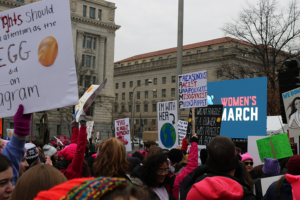
An estimated 65,000 protesters participated in this year’s Women’s March in Washington, D.C., on Jan. 19, even as the organizers face widespread criticism because of close association with antisemitic rhetoric.
Tens of thousands assembled in D.C. on Saturday to protest in favor of the rights of minority groups, an end to violence and environmental justice. March Forward Virginia, the organization responsible for arranging D.C.’s march, estimated around 65,000 attended the march, a number that approximately matches the 50,000 to 70,000 estimated to have marched in 2018.
Both years have failed to equal the record-breaking numbers of people who marched in 2017, with 500,000 marchers in just Washington. Multiple prominent media outlets including The Washington Post have speculated low turnout could be due to the accusations of antisemitism surrounding the organization’s leaders this year.
The Women’s March was accused of promoting antisemitism after Co-President Tamika Mallory posted a photo of her alongside Louis Farrakhan, the leader of the black nationalist group Nation of Islam, on May 11, 2017, calling him the “GOAT.” In February 2017, Farrakhan delivered a speech in which he called Jews “satanic.” The Nation of Islam has been listed as hate group by the Southern Poverty Law Center.
Mallory has refused to take down the post or condemn Farrakhan’s statements because of his contributions to black communities, according to ABC News.
Teresa Shook, a retired lawyer and the original founder of the Women’s March, wrote a Nov. 19 Facebook post calling for the march’s current leaders, Mallory, Bob Bland, Linda Sarsour and Carmen Perez, to step down. The leaders’ refusal to separate themselves from organizations promoting antisemitic, racist and homophobic rhetoric has caused them to deviate from the movement’s original values, Shook said.
“I call for the current Co-Chairs to step down and to let others lead who can restore faith in the Movement and its original intent,” Shook wrote. “As Women’s March founder, I am stepping up to bring focus back to the Unity Principles on which our movement began.”
The march highlighted a variety of diverse issues such as climate change, access to health care and criminal justice reform, according to Hunter Spillan (SFS ’22), who attended the protest.
“I am so glad I attended, because I found the Women’s March to be an outpouring of inclusive and intersectional support,” Spillan wrote in a message to The Hoya. “Signs there reflect a variety of social and political issues, not just women’s rights — including racial and economic issues. ”
Aware of the allegations, Spillan said she attended in spite of the disappointment with the organizers.
“Though I was initially thrown by the recent scandal about the founders’ lack of response to their antisemitic views, I decided that this movement is larger than the actions of any individual person,” Spillan said.
In response to the criticism the organization has received, Women’s March National Organizer Linda Sarsour released a statement clarifying the march’s goals.
“The Women’s March exists to fight bigotry and discrimination in all their forms — including homophobia and anti-semitism — and to lift up the voices of women who are too often left out,” Sarsour wrote. “We’re committed to deepening relationships with any community who has felt left out of this movement.”
The march, which started at 10 a.m. at Freedom Plaza on Pennsylvania Avenue, featured speakers such as actor Ashley Judd, feminist writer Gloria Steinem, Trayvon Martin’s mother Sybrina Fulton, President of Planned Parenthood Cecile Richards and former Ohio State Senator Nina Turner (D-Ohio).
Protests like the Women’s March help keep politicians accountable for their actions, Turner said.
“It’s one thing to protest, and we need protests to remind the people with special titles that the everyday people of this country will not have our voices suppressed,” Turner said. “The State of the Union matters, but the state of the streets matter more.”
Though counterprotesters, some of whom held anti-abortion signs, attended the march, the protesters persisted, Spillan wrote.
“One particular moment I remember is when we marched past a group of all-male pro-life protesters, holding graphic and scientifically incorrect signs about abortion,” Spillan wrote. “The entire crowd of women’s marchers started a chant of ‘My body, my choice.’”
The controversy has been difficult to keep up with, according to Georgetown University College Democrats Chair Rebecca Hollister (COL ’21).
“As a Jewish woman, I take these concerns extremely seriously,” Hollister wrote in an email to The Hoya. “Due to the controversy and differing opinions surrounding the benefits of the march, we are not sponsoring the event in particular.”
Students can help increase the diversity of voices represented by trying to listen to, and understand, different perspectives, according to Hollister.
“I firmly believe that listening is the most important way to resolve conflict and foster understanding,” Hollister wrote. “It’s incredibly important in this day and age to take a step back and actively listen to try and understand someone or a different group.”
Georgetown University College Republicans does not support the Women’s March both for its political agenda and the antisemitism associated with the founders, GUCR President Hayley Grande (COL ’21) wrote in an email to The Hoya.
“However, the official agenda of the Women’s March proposes leftist policy interventions that detract from its central tenet of women’s equality and are not endorsed by GUCR,” Grande wrote. “Furthermore, GUCR strongly condemns the public anti-semitism espoused by top leaders of the Women’s March and refuses to support an organization associated with such bigotry.”




















